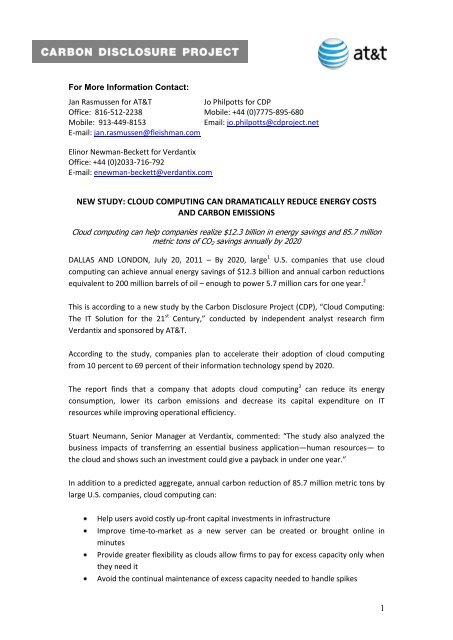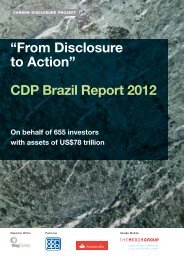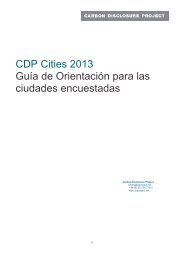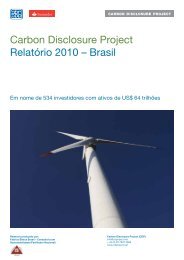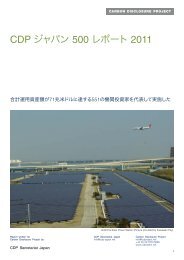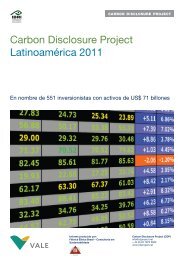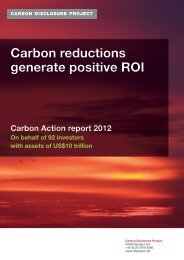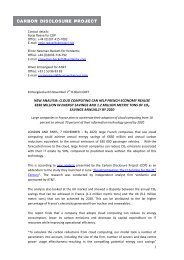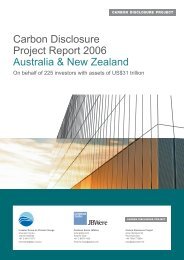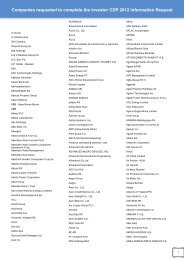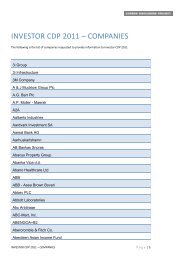Cloud Computing - Carbon Disclosure Project
Cloud Computing - Carbon Disclosure Project
Cloud Computing - Carbon Disclosure Project
You also want an ePaper? Increase the reach of your titles
YUMPU automatically turns print PDFs into web optimized ePapers that Google loves.
For More Information Contact:<br />
Jan Rasmussen for AT&T Jo Philpotts for CDP<br />
Office: 816-512-2238 Mobile: +44 (0)7775-895-680<br />
Mobile: 913-449-8153 Email: jo.philpotts@cdproject.net<br />
E-mail: jan.rasmussen@fleishman.com<br />
Elinor Newman-Beckett for Verdantix<br />
Office: +44 (0)2033-716-792<br />
E-mail: enewman-beckett@verdantix.com<br />
NEW STUDY: CLOUD COMPUTING CAN DRAMATICALLY REDUCE ENERGY COSTS<br />
AND CARBON EMISSIONS<br />
<strong>Cloud</strong> computing can help companies realize $12.3 billion in energy savings and 85.7 million<br />
metric tons of CO2 savings annually by 2020<br />
DALLAS AND LONDON, July 20, 2011 – By 2020, large 1 U.S. companies that use cloud<br />
computing can achieve annual energy savings of $12.3 billion and annual carbon reductions<br />
equivalent to 200 million barrels of oil – enough to power 5.7 million cars for one year. 2<br />
This is according to a new study by the <strong>Carbon</strong> <strong>Disclosure</strong> <strong>Project</strong> (CDP), “<strong>Cloud</strong> <strong>Computing</strong>:<br />
The IT Solution for the 21 st Century,” conducted by independent analyst research firm<br />
Verdantix and sponsored by AT&T.<br />
According to the study, companies plan to accelerate their adoption of cloud computing<br />
from 10 percent to 69 percent of their information technology spend by 2020.<br />
The report finds that a company that adopts cloud computing 3 can reduce its energy<br />
consumption, lower its carbon emissions and decrease its capital expenditure on IT<br />
resources while improving operational efficiency.<br />
Stuart Neumann, Senior Manager at Verdantix, commented: “The study also analyzed the<br />
business impacts of transferring an essential business application—human resources— to<br />
the cloud and shows such an investment could give a payback in under one year.”<br />
In addition to a predicted aggregate, annual carbon reduction of 85.7 million metric tons by<br />
large U.S. companies, cloud computing can:<br />
Help users avoid costly up-front capital investments in infrastructure<br />
Improve time-to-market as a new server can be created or brought online in<br />
minutes<br />
Provide greater flexibility as clouds allow firms to pay for excess capacity only when<br />
they need it<br />
Avoid the continual maintenance of excess capacity needed to handle spikes<br />
1
Improve automation that helps drive process efficiencies<br />
“The study results make a powerful case for businesses to continue to explore and adopt<br />
secure and flexible cloud computing solutions,” said John Potter, Vice President, As-a-Service<br />
Solutions, AT&T.<br />
Andrew Winston, leading expert on sustainable business and author of Green to Gold and<br />
Green Recovery, said: “Finding providers and partners that can take some of your energyusing<br />
operations to scale, and manage them in a shared capacity, is good for both business’<br />
carbon footprint and its bottom line.”<br />
The study suggests that significant non-monetary benefits can be achieved with cloud<br />
computing, including business process efficiency and increased organizational flexibility. Paul<br />
Stemmler from Citigroup commented: “<strong>Carbon</strong> reduction is one driver, but not the primary<br />
driver. The primary driver is time to market. Developers used to take 45 days to get new<br />
servers, but in the internal cloud infrastructure that we operate in our own private network,<br />
it takes just a couple of minutes.”<br />
Verdantix conducted in-depth interviews with multi-national firms—including Aviva, Boeing,<br />
Citigroup and Juniper Networks— in diverse sectors. All study participants had adopted<br />
cloud services for at least two years. Many of the firms interviewed reported cost savings as<br />
a primary motivator, with anticipated cost reductions as high as 40 – 50 percent.<br />
Luis Neves, Chairman of the Global e-Sustainability Initiative (GeSI) commented on the<br />
report: “We are delighted to lend our methodology to this valuable and fascinating new<br />
insight into the financial and sustainability benefits of cloud computing.”<br />
Paul Dickinson, Executive Chairman of CDP, welcomed the ICT sector’s leadership in driving<br />
sustainability: “A large percentage of global GDP is reliant on ICT – this is a critical issue as<br />
we strive to decouple economic growth from emissions growth. The carbon emissionsreducing<br />
potential of cloud computing is a thrilling breakthrough, allowing companies to<br />
maximize performance, drive down costs, reduce inefficiency and minimize energy use – and<br />
therefore carbon emissions – all at the same time.”<br />
This study follows the release of a recent paper, “Building a 21 st Century Communications<br />
Economy.” Tying these studies together, Dickinson commented: “The communications<br />
economy of the 21 st century has the potential to generate more economic value with less<br />
environmental impact, and ICT companies will lead the way.”<br />
The full cloud computing report can be downloaded at https://www.cdproject.net/en-<br />
US/WhatWeDo/Pages/<strong>Cloud</strong>-<strong>Computing</strong>.aspx.<br />
2
About the <strong>Carbon</strong> <strong>Disclosure</strong> <strong>Project</strong> (CDP)<br />
CDP is an independent not-for-profit organization holding the largest database of primary<br />
corporate climate change information in the world. Some 3,000 organizations and cities<br />
across the world’s largest economies now measure and disclose their greenhouse gas<br />
emissions and climate change strategies through CDP, in order that they can set reduction<br />
targets and make performance improvements. This data is made available for integration<br />
into local government, business and policy decision making. For more information visit<br />
www.cdproject.net.<br />
About Verdantix<br />
Verdantix is an independent analyst firm focused on sustainable business. We provide<br />
authoritative data, analysis and advice to help our clients resolve their energy, environment<br />
and sustainability challenges.<br />
About AT&T<br />
AT&T Inc. (NYSE:T) is a premier communications holding company. Its subsidiaries and<br />
affiliates – AT&T operating companies – are the providers of AT&T services in the United<br />
States and around the world. With a powerful array of network resources that includes the<br />
nation's fastest mobile broadband network, AT&T is a leading provider of wireless, Wi-Fi,<br />
high speed Internet and voice services. A leader in mobile broadband, AT&T also offers the<br />
best wireless coverage worldwide, offering the most wireless phones that work in the most<br />
countries. It also offers advanced TV services under the AT&T U-verse ® and AT&T | DIRECTV<br />
brands. The company's suite of IP-based business communications services is one of the<br />
most advanced in the world. In domestic markets, AT&T Advertising Solutions and AT&T<br />
Interactive are known for their leadership in local search and advertising.<br />
Additional information about AT&T Inc. and the products and services provided by AT&T<br />
subsidiaries and affiliates is available at http://www.att.com. This AT&T news release and<br />
other announcements are available at http://www.att.com/newsroom and as part of an RSS<br />
feed at www.att.com/rss. Or follow our news on Twitter at @ATT. Find us on Facebook at<br />
www.Facebook.com/ATT to discover more about our consumer and wireless services or at<br />
www.Facebook.com/ATTSmallBiz to discover more about our small business services.<br />
© 2011 AT&T Intellectual Property. All rights reserved. Mobile broadband not available in all<br />
areas. AT&T, the AT&T logo and all other marks contained herein are trademarks of AT&T<br />
Intellectual Property and/or AT&T affiliated companies<br />
1 Represents the 2,653 firms generating revenues of more than $1 billion in the U.S.<br />
2 Based on Bureau of Transportation Statistics average mpg, Federal Highway Administration average annual<br />
mileage and the Energy Information Agency gallons of gasoline per barrel of oil.<br />
3 For an explanation of cloud computing, see pp. 6-7 of the report.<br />
3


